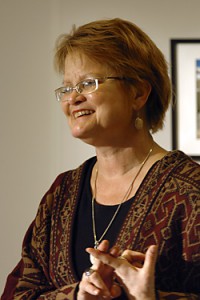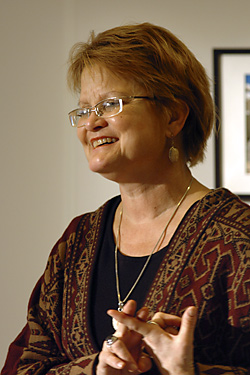 Kim Lacy Rogers, a leading figure in oral history, unexpectedly died on Friday, February 21 at her home in Carlisle, Pennsylvania, where she was Professor of History and American Studies at Dickinson College. Although continuing to teach, she had been in declining health. She was a few days shy of her 63rd birthday.
Kim Lacy Rogers, a leading figure in oral history, unexpectedly died on Friday, February 21 at her home in Carlisle, Pennsylvania, where she was Professor of History and American Studies at Dickinson College. Although continuing to teach, she had been in declining health. She was a few days shy of her 63rd birthday.
Soon after receiving her Ph.D. from the University of Minnesota in 1983, Kim Rogers began authoring what would become an extremely influential collection of oral history-related books and articles. Much of her research involved African American communities in the deep South, particularly in New Orleans and the Mississippi Delta. Along with Professor Jerry Ward of Tougaloo College, she directed the Delta Oral History Project, conducting oral history interviews from 1995 through 1998.
Rogers’s work was marked by insight, depth, and capaciousness. Her numerous publications include Righteous Lives: Narratives of the New Orleans Civil Rights Movement (1993); Interactive Oral History Interviewing (co-edited with Eva McMahan) (1994); Trauma and Life Stories: International Perspectives (co-edited with Selma Leydesdorff) (1999); and Life and Death in the Delta: African American Narratives of Violence, Resilience, and Social Change (2006), which won the 2007 Oral History Association Book Award as well as the 2008 National Council on Public History Book Award. Following her interest in Eastern religions, at the time of her death she was researching contemporary religious pluralism in the American Southwest.
Rogers joined the faculty of Dickinson College in 1983 where she taught courses centered on recent American history, urban history, and gender and family history. Along with her colleagues Jeremy Ball and Amy Wlodarski, she was the 2010 recipient of the OHA Postsecondary Teaching Award for the series of courses entitled, “Black Liberation Mosaic: South Africa and Mississippi.” She also served as director of Dickinson’s Community Studies Center, which she was instrumental in founding.
In addition, Rogers played a leading role in the Oral History Association. She chaired the Publications Committee, and served on the OHA Council in the late 1990s and then again as an officer, including as OHA president in 2004-2005. It was because of her efforts that the OHA had its executive office at Dickinson College from 1999 through 2012.
